Officials Attend Concert Marking Beginning of Croatia's EU Presidency
ZAGREB, January 10, 2020 - The most senior EU and Croatian officials gathered at the Croatian National Theatre (HNK) in Zagreb on Thursday evening for a concert that officially marked the start of Croatia's presidency of the European Union in the first half of 2020.
The HNK choir, orchestra and soloists performed works by Mozart, Verdi, Beethoven, Gounod and Dvorak as well as works by the Croatian composers Vatroslav Lisinski, Ivan Zajc and Jakov Gotovac to an audience that included European Council President Charles Michel, European Commission President Ursula von der Leyen, outgoing President Kolinda Grabar-Kitarović, Parliament Speaker Gordan Jandroković and Prime Minister Andrej Plenković and all members of his government.
Croatia took over the presidency of the EU from Finland on January 1. At the end of June, the rotating EU presidency will be taken over by Germany.
"A Strong Europe in a World of Challenges" is the slogan of Croatia's EU presidency.
Addressing the guests, PM Plenković recalled that Croatia was chairing the EU in the seventh year of its EU membership and ahead of the 30th anniversary of the introduction of democracy.
In this role Croatia has an opportunity, in partnership with member-states and institutions, to give Europe its contribution and a new impetus, said the PM of the youngest of the EU's 28 members.
He added that the European cultural heritage, a product of interaction between national cultures, was a motive for political action and discussions about Europe's future.
Our goal in that process should be to further democratise political decision-making and bring European policies and institutions closer to citizens in order to better respond to their expectations and needs, said Plenković.
The visit of the European Commission to Zagreb and the concert at the HNK officially marked the beginning of Croatia's EU presidency, and its international beginning will be marked with a concert in Brussels, on January 15, the day of Croatia's international recognition and the peaceful reintegration of its eastern Danube region.
Croatia's EU presidency coincides with the very beginning of a new EU institutional and legislative cycle, launched with the appointment of new EU bodies.
The most important tasks facing the EU in the coming months are an agreement on the next, seven-year budget, an agreement on future relations with Great Britain, a conference on Europe's future and a legislative framework for the fight against climate change.
More news about Croatia and the EU can be found in the Politics section.
UNHCR Calls on Croatia to Improve Refugee Protection During EU Presidency
ZAGREB, January 10, 2020 - The Croatian and German Presidencies of the European Union in 2020 present opportunities to improve refugee protection, primarily by reforming the asylum system and providing greater support to the countries where most refugees live, the United Nations refugee agency (UNHCR) said on Thursday on the occasion of the start of Croatia's presidency of the Council of the EU.
"The Presidencies and the envisaged Pact on Migration and Asylum present unique opportunities to better protect forcibly displaced and stateless people in Europe and abroad, while supporting host countries," the UN High Commissioner for Refugees (UNHCR) said in its recommendations for the Croatian and German presidencies of the Council of the EU this year.
"As we enter a new decade, and following the success of the Global Refugee Forum, the EU under its Presidencies has the chance to make 2020 the year of change for robust refugee protection," said Gonzalo Vargas Llosa, UNHCR’s Regional Representative for EU Affairs.
UNHCR’s recommendations propose a truly common and workable asylum system within the EU through sustainable reform and revitalised financial support for countries hosting forcibly displaced people outside the EU, the UN agency said in a statement.
"Inside the EU, fair and fast asylum procedures need to be established to quickly determine who needs international protection and who does not. People eligible for protection should quickly be granted status and receive support for integration. Those not eligible to any form of protection should be assisted in their return.
"Responsibility-sharing with EU Member States receiving a disproportionate number of asylum claims is also needed to ensure a truly common and workable asylum system. UNHCR is encouraging the Presidencies to advance work on an effective solidarity mechanism, including through relocation arrangements, with family unity prioritized," the statement said.
"The pre-accession process provides opportunities to support countries in the Western Balkans in terms of further developing their asylum systems. UNHCR remains ready to continue to work with the EU institutions and Agencies in the further development of protection-sensitive border management, fair and efficient asylum procedures and first reception capacity, ensure a consistent regional approach to registration, strengthen access to fundamental rights and services, as well as expand integration opportunities," the UN refugee agency said.
"With 85 percent of the world’s refugees hosted in neighbouring and developing countries, revitalized financial support is also needed," UNHCR warned and proposed that the Presidencies "ensure increased and diversified funding, including for development cooperation funding, to further support host countries and help forcibly displaced people rebuild their lives."
"The next EU budget (Multi-annual Financial Framework 2021-2027) is a key opportunity for the EU to demonstrate global solidarity towards forcibly displaced people and their hosts," it added.
UNHCR concluded by saying it remains ready to support the Croatian and German Presidencies, the EU, and its Member States as they work to enhance solidarity with refugees and the countries hosting them in the EU and globally.
More news about the migrant crisis can be found in the Politics section.
Škoro Rejects Criticisms That He brought Milanović to Power
ZAGREB, January 10, 2020 - Miroslav Škoro, a presidential candidate nominated by right-wing anti-establishment parties who failed to make it into the second round, has rejected criticisms that he has brought Social Democrat Zoran Milanović to power.
Speaking in an interview with the Večernji List daily of Friday, he said he was analysing why he had not won more than 24.5 percent of votes in the first round of the presidential election and what should have been done to ensure a better result.
"In such a demanding competition with a million variables, only an ignorant and arrogant person can shift the blame onto another," Škoro said.
He said it was ridiculous that he was being criticised for telling his voters to vote in the interest of Croatia and according to their conscience in the runoff. "Were they supposed to go against themselves and their country?" he wondered.
Commenting on a statement by the chairman of the parliamentary group of the ruling HDZ party, Branko Bačić, that he hoped for future cooperation and a coalition with his party, Škoro said: "I didn't enter politics to trade, but to change things. And that's impossible if you work in the same way as they have so far. I'm not interested in that. Secondly, even if I wanted to trade, I have nothing to trade with."
He said it was important to him to form a third, stable political group.
Asked if he was going to form his own party, Škoro said that this was a technical issue, adding that he would talk with the people and political groups that supported him to see what their plans were.
He said he was not anyone's project. "This amazing result is solely the result of my cooperation with my people and partner parties."
More news about Miroslav Škoro can be found in the Politics section.
A Look at New Luxury Hotels Opening in Croatia in 2020
January 10, 2020 - A number of new hotels will open in Croatia this year. A look at five unique luxury hotels that should open this spring or at the start of the tourist season.
According to the eVisitor system, more than 1,170 hotels with about 172,000 beds are registered in Croatia.
Of the total accommodation capacity, which amounts to about one million beds, hotels account for only about 12 percent.
However, five hotels will improve that ratio somewhat. A look at the new luxury hotels opening in Croatia this year, courtesy of T.portal.
Hotel Costabella, Rijeka
The five-star Costabella Hotel Complex is set to open this summer. It will have 280 rooms with a total of 560 beds, a large area for wellness, fitness and a private sandy beach.
All rooms and suites will have views of the Kvarner Bay. The resort will offer six restaurants, a beach bar, and a rooftop restaurant.
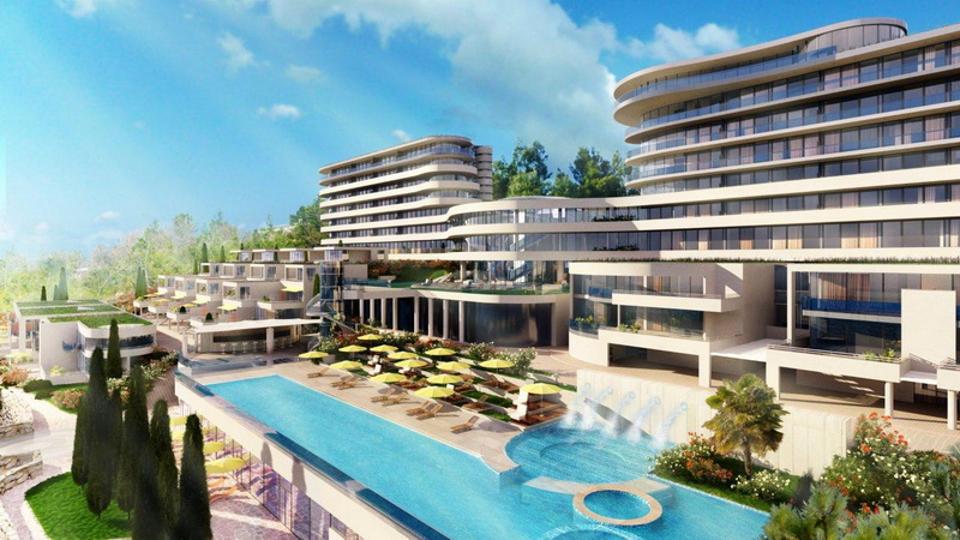
Costabella Simulation / Facebook
The investment is worth as much as 80 million euros. The investor is JTH Costabella. The resort will be part of the Hilton hotel chain.
Hotel Ambasador, Split
The new Ambassador Hotel is expected to have four-plus stars, with 101 rooms and suites, 240 restaurant seats, a spa, a gym, a nightclub and an underground garage with 59 spaces.
The Ambassador is seeing an investment by one of the world's most famous shoemakers, Klaus Alex Birkenstock, who announced that he was planning to build a new favorite tourist resort for tourists from the United Kingdom, Germany, Austria and France from the once dilapidated building on the Split waterfront.
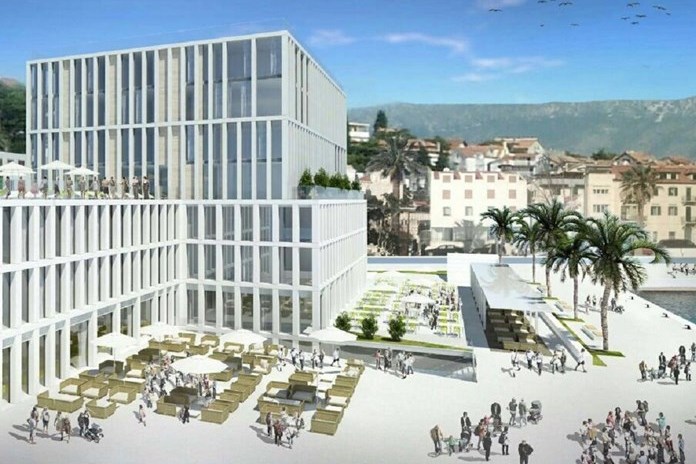
Ambasador Simulation
Birkenstock has invested around 17 million euros in the new hotel.
Hotel Armerun, Šibenik
The Armerun Hotel will have 17 accommodation units, 14 of which are in the property itself, while three are in a separate property that can be rented as a villa. It will have two categorizations, one with four stars and as a heritage hotel.
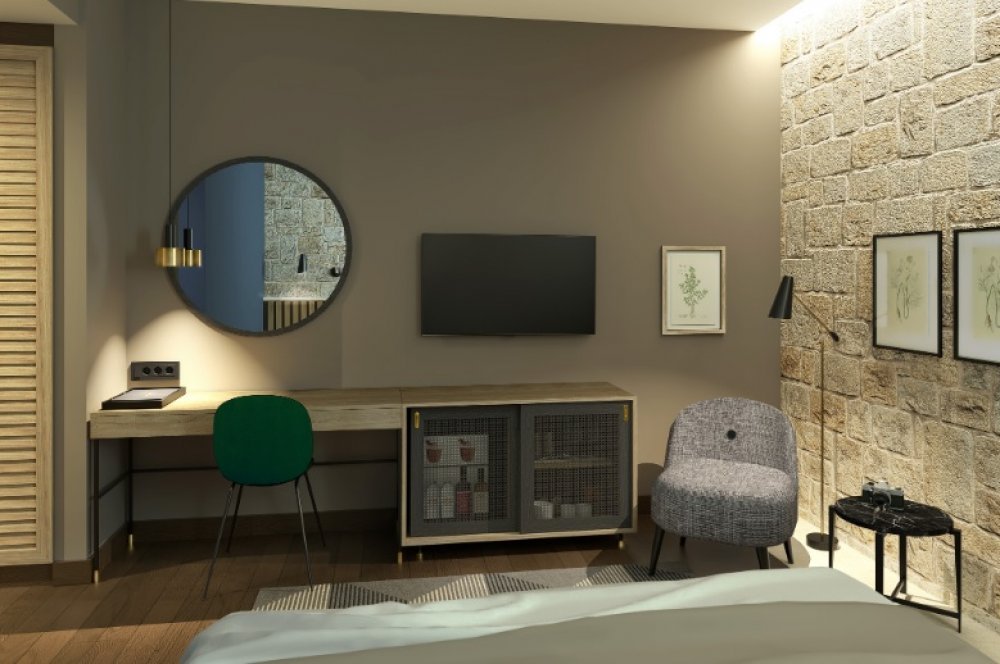
Screenshot
On the ground floor of the hotel, there will be a restaurant for outside guests to enjoy.
The hotel is scheduled to open in the spring of 2020. The total value of the investment is around 2 million euros and the main investor is the company Stanovi Jadrana.
Amfora Resort, Split
The Hotel Amfora by Zvonko Kotarac, a businessman from Split, was supposed to open last year, but due to construction problems (and an invalid building permit), the opening has been delayed.
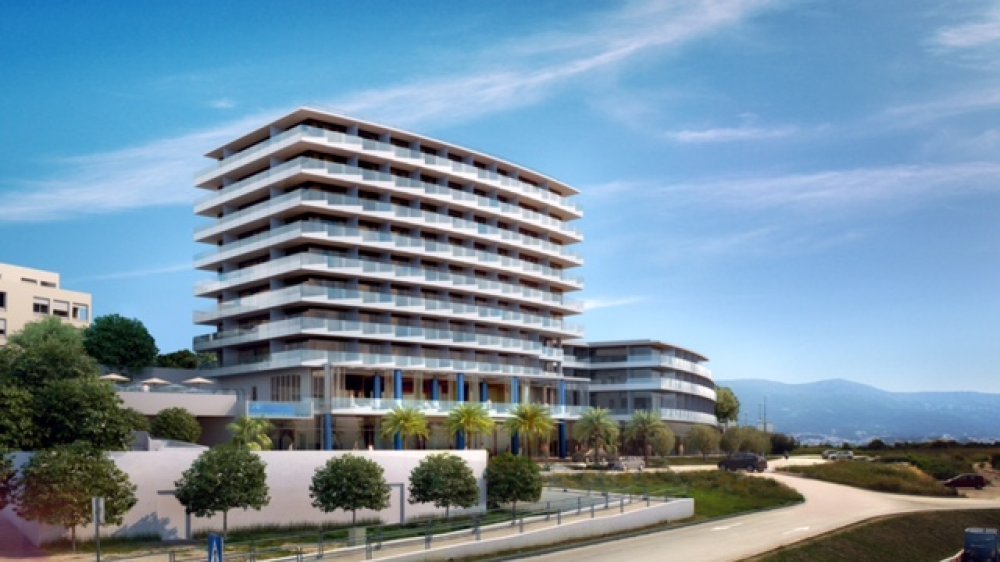
Amfora Simulation
The total investment is over 26 million euros. The investor insisted that the hotel would have 207 rooms and suites, a 500-seat congress hall and 2000 square meters of wellness.
Courtyard by Marriott, Split
Courtyard by Marriott, the business brand of the renowned Marriott International Group, should also open this year. The hotel is located in the Dalmatia Tower, the tallest building in Croatia, standing 115 meters tall.
Courtyard by Marriott will be located on the building’s top floors, from the 16th to 26th, allowing guests a spectacular view of the city, and because of the specific shape of the building, each of the 190 rooms and four suites will have sea views.
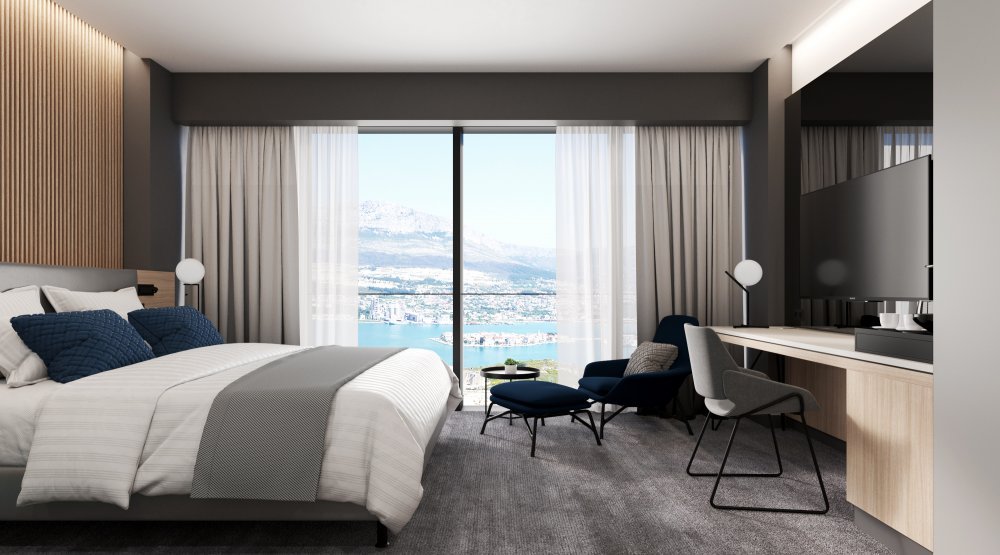
Westgate Group
In addition to the conference facilities, the hotel will feature a wellness area, a gym, a restaurant and a bar.
To read more about travel in Croatia, follow TCN’s dedicated page.
Split Ferry Port Records 5.6 Million Passengers in 2019
January 10, 2020 - The Split Ferry Port registered a record annual turnover of 5.6 million passengers and 827,000 vehicles in 2019, the Port Authority of Split announced.
"The total traffic of 5,616,000 passengers at the Split Ferry Port in 2019 is up four percent from a year earlier and is a record annual turnover," said Vjekoslav Grgic of the Port Authority of Split.
Splitski Dnevnik reports that a new record was also achieved in the number of vehicles at the Split Ferry Port, totaling 827,000 vehicles in 2019, which is three percent higher than a year earlier.
"Throughout 2020, we expect a further increase in passenger and vehicle traffic of about three percent compared to last year's traffic," Grgic said.
He noted that despite the heavy traffic, there is no delay in the entry and departure of ships, which is extremely important for tourists.
Furthermore, Split Airport ended the year with a total of 3,301,930 passengers. Ex Yu Aviation reports that Split Airport had more passengers than Zagreb Airport, which is Croatia’s busiest, from August until the end of November, which is the longest it has held such a lead.
"Almost half of our annual traffic is achieved during July and August. During the four summer months we have the most passenger traffic in the country. We are extremely seasonal in character but when looking at it on an annual level, we are in second place,” said General Manager Luksa Novak about how extreme seasonality may prevent Split Airport from overtaking Zagreb annually.
Recall, Split Airport also opened a new terminal in 2019, which is larger by an additional 34,500 square meters, and totals 46,000 square meters, with a peak load of up to 2,500 passengers per hour. There are 32 counters to register passengers and 10 self-check-in counters, and an upgraded baggage handling system. There is also a newly built bus terminal of almost 3,000 square meters, with 50 parking spaces for buses and 900 parking spaces for cars.
By value, the Split Airport project was ranked among the most significant on the national level and next to the airport terminals in Zagreb and Dubrovnik by its complexity and structure.
Executed on a total surface of nearly 80,000 square meters, the Split Airport project brought improvements to airport infrastructure, building capacity, increases passenger and employee safety, improves the quality of service, and creates conditions following Schengen criteria, as well as those of international and domestic traffic.
To read more about travel in Croatia, follow TCN’s dedicated page.
Euro 2020: Croatia Handball Team Opens Tournament with Win Against Montenegro
January 9, 2020 - The Croatia handball team opened the European Championship in Graz with a win against Montenegro 27-21 (12-13) in Group A.
Croatia and Montenegro met in front of 5,000 spectators on Thursday at the Stadthalle Hall in Graz, Austria, to begin their European Championship campaign.
Croatia showed a lot of weaknesses in the first half, especially in the defense, but the persistent Montenegrin team was broken at the beginning of the second half thanks to a 9-3 series. Croatia was phenomenal in the second half and overcame any weaknesses shown in the first.
Croatia started the match with two missed shots by Cindric, and their first goal came only in the 5th minute. Montenegro led 3-1. By the 19th minute, Croatia came to an advantage for the first time and was up by two goals (9-7).
However, Lino Cervar's side failed to reach a more significant advantage by the end of the first half. Moreover, Montenegrin goalkeeper Simic defended well, and with a mini-series of 4-0, Montenegro led 13-11 at the end of the half. Maric scored in the last second of the first half for 12-13.
At the beginning of the second half, and namely in the first five minutes, Croatia had a 5-1 series to lead 17-14. Croatia then increased their lead to 21-16 in the 46th minute. With a Mandic goal, Croatia increased their lead by six goals (23-17) and the Cowboys secured a peaceful ending to the game, with debutants Sarac, Ravnic, Matanovic and Hrstic entering the court.
Luka Cindric was the most efficient for Croatia with six goals, followed by Marino Maric and Zlatko Horvat, who scored four each and Marin Sipic, who scored three goals. Montenegro was led by Nemanja Grbovic (6) and Vladan Lipovina (4).
In round 2 on Saturday, Croatia plays against Belarus at 4 pm, and Serbia-Montenegro will meet at 6.15 pm.
The two first-ranked teams from the group move to the second round in Vienna.
Source: HRT
To read more about sport in Croatia, follow TCN’s dedicated page.
Day Remembering Međimurje's Unification with Croatia Marked in Čakovec
ZAGREB, January 9, 2020 - The day commemorating the unification of the region of Međimurje with the parent country Croatia was marked at a ceremony in the northern town of Čakovec on Thursday.
An envoy of the Croatian state leadership, Mursko Središće Mayor Dražen Srpak, said that on 9 January 1919 Međimurje had actually reunited with Croatia, its parent country, to which it had always belonged, and with the Croat people.
Međimurje County remembers today an important date in its history, when at a large national assembly in Čakovec on 9 January 1919 a resolution was adopted on Međimurje's secession from the Kingdom of Hungary.
Wreaths were laid at the Čakovec cemetery at a monument to Ivan Novak, the organiser of a military campaign for liberation from Hungarians, and the graves of all those who had contributed to the adoption of the decision on Međimurje's unification with the parent country were visited as well.
Srpak, a member of the ruling HDZ party, said that Međimurje had always belonged to the Croatian homeland. It was never really a part of Hungary and the people of Međimurje never started speaking the Hungarian language, he said.
Asked about Hungarian Prime Minister Viktor Orban's policy and his having photos of himself taken by a historical map showing Međimurje as part of Hungary, Međimurje County Assembly head Mladen Novak said that Hungary's policy had not changed for a hundred years and would probably never change, and that the residents of Međimurje always had to be prepared for the challenges of such a policy.
"We are quiet but when we raise our voice, we are pretty fierce and we know how to fight for our interests," said Novak.
Attending the ceremonies was also county head Matija Posavec.
The day commemorating Međimurje's unification with the parent country Croatia is observed as a memorial day in line with a Croatian parliament decision of 2005.
The adoption of the resolution on the secession of Međimurje from the Hungarian state is important because of its relevance for the historic aspiration to preserve the integrity of Croatian territory.
After the military liberation of Međimurje, a large national assembly was held in Čakovec on January 9, 1919, at which a resolution was adopted on the secession of Međimurje from the Hungarian state and a wish was expressed to join the then Kingdom of Serbs, Croats and Slovenes.
Even though Hungarians gave up on Međimurje only in 1920, after the Treaty of Trianon, the national assembly in Čakovec was one of the most important decisions for the Croatian population of Međimurje and was attended by more than 10,000 people. Dr Ivan Novak is considered as the person who deserves most credit for secession from Hungary.
More Međimurje news can be found in the Politics section.
Zagreb Archbishop Congratulates President-Elect Milanović
ZAGREB, January 9, 2020 - The Archbishop of Zagreb, Cardinal Josip Bozanić, on Thursday congratulated Zoran Milanović on being elected President of Croatia, stressing the importance of cooperation between Church and State in the interest of the Croatian people.
Bozanić expressed his best wishes to Milanovic in performing the duties entrusted to him, which include looking after the wellbeing of the Croatian people and all citizens of Croatia.
The Church and State are called upon to pursue cooperation and dialogue in promoting harmony, justice, peace and prosperity in the Croatian society, he added.
"This dialogue strives to strengthen mutual respect and understanding as well as to prevent or rectify any misunderstandings, always bearing in mind the same interests, those being people, especially those most vulnerable, and the common good," the archbishop said in his message.
"On the generally accepted and firm foundation of the Croatian identity, which is characterised by a rich tradition imbued with Christianity, it is possible, without fear or a feeling of being threatened, to foster freedom and the beauty of a diversity of opinions, views and creative life, and an openness to cooperation and friendship with all nations," Bozanić wrote.
More news about the Catholic Church can be found in the Politics section.
Powerful Passports: How Does Croatian Passport Stand?
Although you might immediately think about Germany and the USA when asking the question of the world's most powerful passports, but the most powerful passport in the world is neither American nor German. Just how does the trusty little Croatian passport fare when it comes to travelling and not having to deal with burdensome procedures and visas when crossing borders?
As Poslovni Dnevnik writes on the 9th of January, 2020, according to a study conducted by the British authorities in collaboration with Henley & Partners, figures show that Japanese citizens are likely to be the happiest travellers in 2020 because they have the least issues with visas or special documents when crossing borders, punkufer.dnevnik.hr reports.
Those with the most powerful passports can enter as many as 191 countries with just their passports and without needing a visa, while citizens of Afghanistan, which is considered the worst passport in the world currently, can only enter a mere 26 countries without possessing a visa.
The Republic of Croatia shares a very comfortable twentieth place alongside Hong Kong, and holders of the Croatian passport can travel freely to 169 countries worldwide. You can view the full list here.
Best passports:
1. Japan (191 destinations)
2. Singapore (190)
3. South Korea, Germany (189)
4. Italy, Finland (188)
5. Spain, Luxembourg, Denmark (187)
6. Sweden, France (186)
7. Switzerland, Portugal, Netherlands, Ireland, Austria (185)
8. USA, United Kingdom, Norway, Greece, Belgium (184)
9. New Zealand, Malta, Czech Republic, Canada, Australia (183)
10. Slovakia, Lithuania, Hungary (181)
Worst passports:
100. North Korea, Sudan (39 destinations)
101. Nepal, Palestine (38)
102. Libya (37)
103. Yemen (33)
104. Somalia, Pakistan (32)
105. Syria (29)
106. Iraq (28)
107. Afghanistan (26)
Make sure to follow our dedicated lifestyle and travel pages for much more.
Zagreb Hosting Meeting of European Commission College
ZAGREB, January 9, 2020 - The College of Commissioners, comprised of the 27 Commissioners, is holding a meeting on Thursday and Friday in Zagreb, at the start of Croatia's six-month rotating presidency of the European Union, and the gathering is chaired by European Commission President Ursula von der Leyen.
The gathering of the College of Commissioner in Zagreb formally marks the start of Croatia's presidency in the first half of 2020.
European Council President Charles Michel, who arrived in Zagreb on Wednesday, will attend the two-day meeting.
Commission President von der Leyen and other members of the EC are arriving in the Croatian capital on Thursday and in the evening, they will attend a special concert in the Croatian National Theatre (HNK).
Upon the gala concert in the HNK, Croatian President Kolinda Grabar-Kitarović will give a reception for the guests.
On Friday morning, Prime Minister Andrej Plenković receives the EC President von der Leyen, and their meeting is scheduled before the start of the meeting of the Croatian government and the College of Commissioners in the Croatian National and University Library (NSK).
After that, Plenković and von der Leyen are due to address the press.
The events in Zagreb are being covered by some 60 Brussels correspondents who came in Zagreb on Wednesday for the College meeting at the start of Croatia's EU presidency as part of regular practice by EU countries-in-chair to invite correspondents from Brussels at the start of their rotating EU presidency. On that occasion, journalists were briefed about the priorities of the Croatian presidency by PM Plenković on Wednesday afternoon.
The College of Commissioners, comprised of the 27 Commissioners, meets as a general rule at least once per week. This weekly decision-making procedure is called the oral procedure.
In practice, the Commissioners meet every Wednesday morning in Brussels. However, during the plenary sessions of the European Parliament in Strasbourg, the meeting takes place on a Tuesday.
More news about Croatia and the EU can be found in the Politics section.

